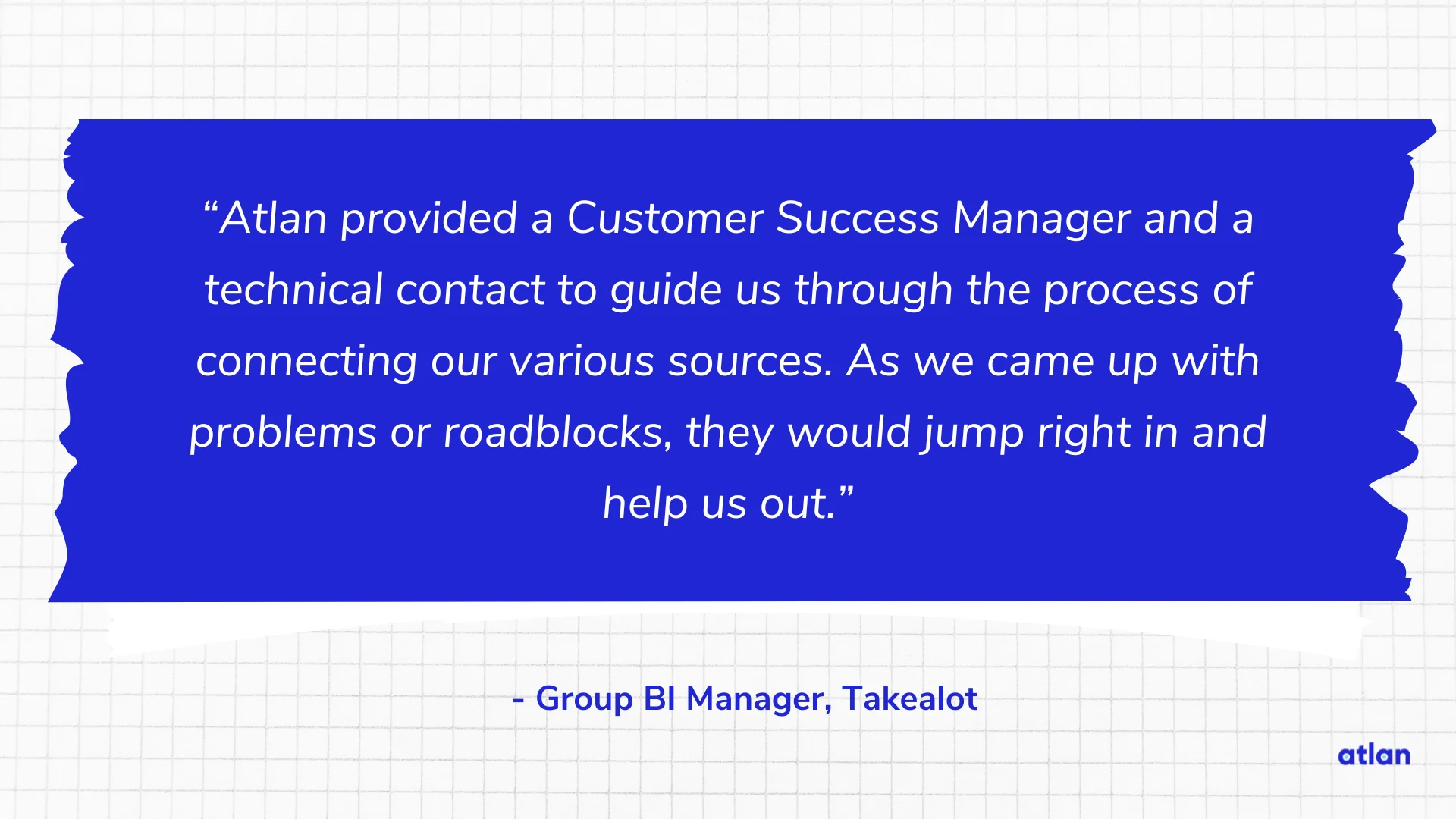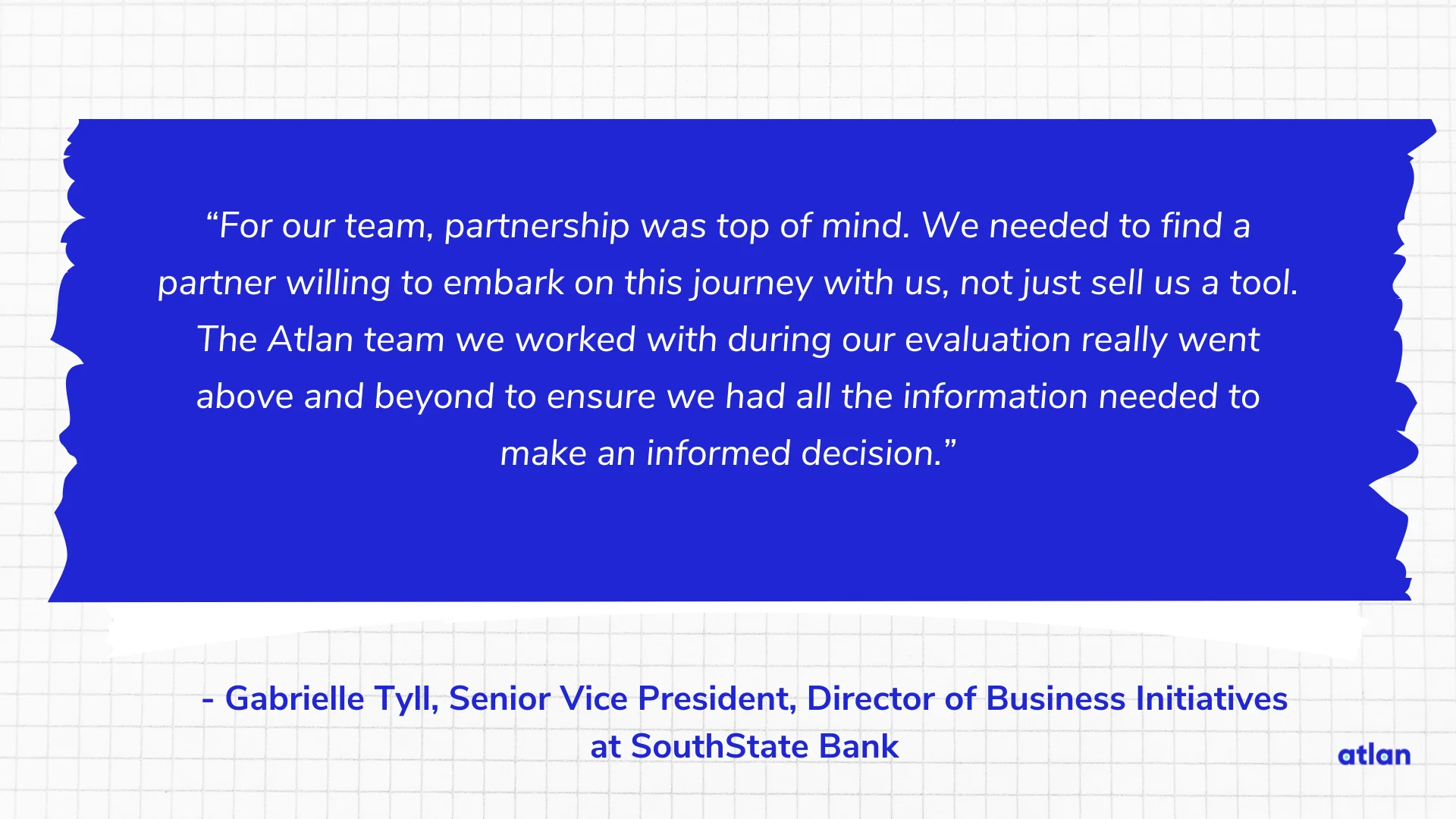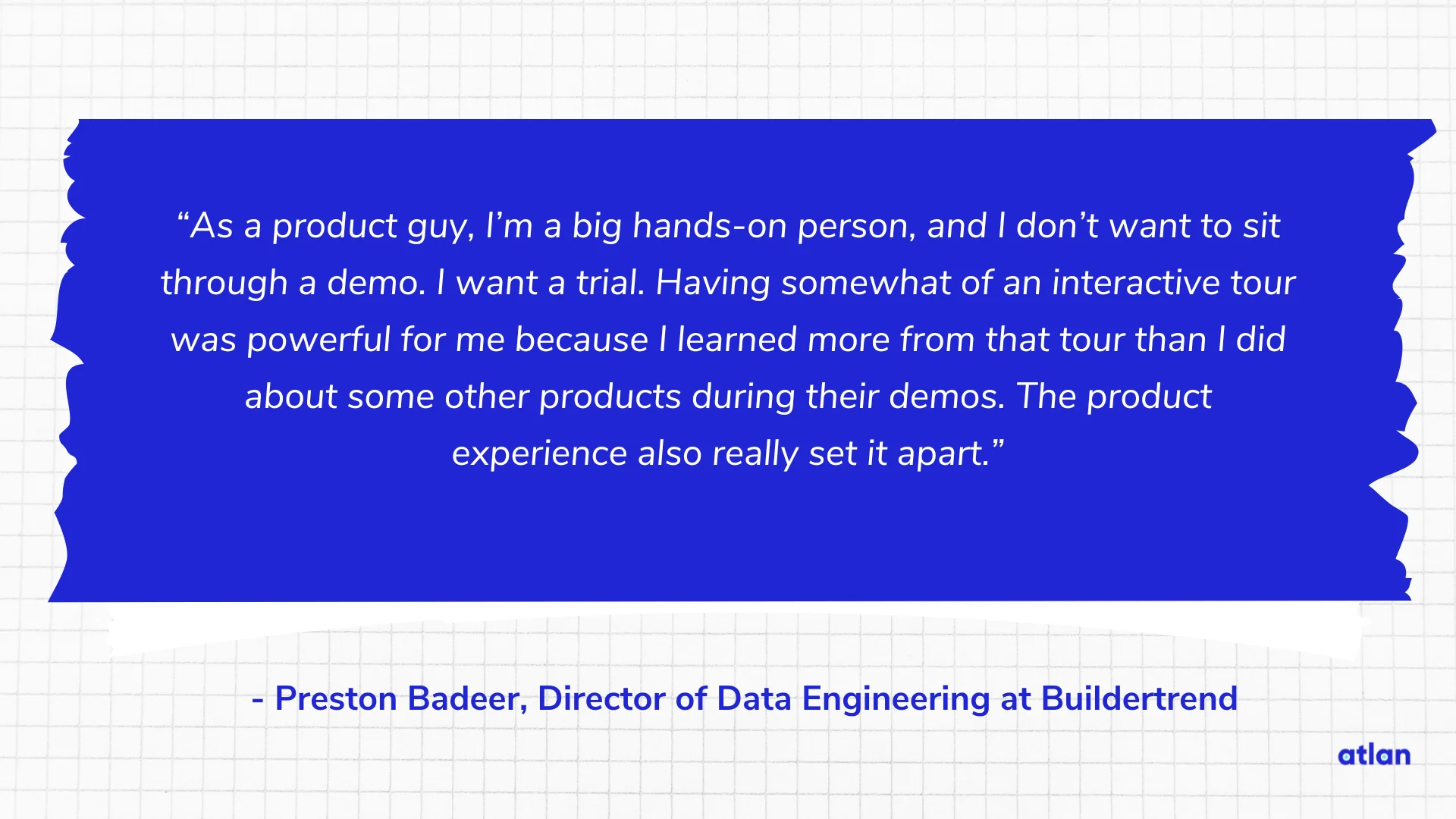Data Catalog Demo 101: What to Expect, Questions to Ask, and More
Share this article
A data catalog demo is a guided walkthrough showcasing the features, capabilities, business benefits, and UI of a data catalog platform. You get to see, with hands-on experience, whether the data catalog meets your organization’s unique needs.
This article discusses why data catalog demos are imperative to choosing the right catalog for your business. We’ll explore the contents of an ideal data catalog demo, along with ways to prepare and questions to ask during the demo.

Looking for a data catalog with an ROI you can present to your CDO? Atlan is designed for adoption and embedded with automation. It helps you save time, cut cloud costs, and make faster, better decisions that lead to revenue.
Table of contents
Permalink to “Table of contents”- Data catalog demo: Why do you need one?
- Who should attend a data catalog demo?
- Data catalog demo benefits: What’s in it for you?
- Inside a data catalog demo: What should you expect?
- Get ready for a data catalog demo: How to prepare in 8 steps
- Related Reads
Data catalog demo: Why do you need one?
Permalink to “Data catalog demo: Why do you need one?”A data catalog demo is crucial to making an informed choice while evaluating a list of tools. It provides hands-on experiences that enable you to assess whether the catalog aligns with your unique needs and objectives.
You can customize the demo to address your needs and see the data catalog in action to get a more in-depth portrait of its capabilities and limitations.
During the demo, you can involve other data practitioners and business users from your organization so that they can ask questions related to their daily workflows and use cases.
Who should attend a data catalog demo?
Permalink to “Who should attend a data catalog demo?”Anyone involved in data management and decision-making within your organization should attend the data catalog demo. To gather comprehensive feedback on your data catalog options, assemble a core team of stakeholders from the following areas:
- Data professionals: Data engineers, scientists, analysts, and architects who need to understand the technical capabilities, integrations, and extensibility of the data catalog.
- Business users: Project managers, data product managers, and business analysts who will use the catalog to find, understand, and leverage data for decision-making.
- Data governance & compliance: Data stewards, product owners, and compliance officers who need to ensure the catalog supports their data governance policies and regulatory requirements.
- IT & security: Security professionals, legal teams, and risk managers who need to evaluate the catalog’s security features, authentication mechanisms, encryption standards, and audit capabilities.
- Leadership: Executives and senior management who want to assess the catalog’s strategic value, potential ROI (return on investment), and alignment with business goals.
The specific individuals involved may vary depending on your organization’s size, structure, and data maturity. However, keeping the attendees diverse will ensure that the demo considers all relevant perspectives and addresses the needs of various stakeholders.
Data catalog demo benefits: What’s in it for you?
Permalink to “Data catalog demo benefits: What’s in it for you?”A good data catalog demo will be tailored to your organization’s data stack, use cases, and pain points.
For instance, if your organization uses Snowflake and Tableau, the demo will show how the catalog crawls metadata from these tools, organizes that information, maps lineage, and ensures interoperability.
Meanwhile, if your organization struggles with data quality, the catalog would highlight features like root cause analysis, proactive issue alerting, automated data quality checks, and a data quality metrics dashboard.
The greatest benefits of exploring data catalogs with such customized demos are:
- Seeing the data catalog in action with real scenarios/use cases and exploring the full range of relevant features and functionalities
- Evaluating the data catalog’s UI for its intuitive controls, ease of navigation, and frictionless user experience
- Comparing features, functionalities, and capabilities side-by-side with other data catalogs that you may be evaluating
- Getting personalized answers to questions that are specific to your organization’s needs
- Making an informed decision in collaboration with key stakeholders with diverse backgrounds and roles within your organization
More importantly, the demo is a great opportunity to evaluate the data catalog solution provider and their commitment to your success. Ideally, you’d want a partner invested in helping you drive data-driven decision-making, rather than a mere data catalog vendor.
So, let’s delve deeper into the significance of choosing a partnership-based approach
Choosing a partner, rather than a vendor
Permalink to “Choosing a partner, rather than a vendor”Choosing the right data catalog requires a holistic approach. It goes beyond the functionalities of a data catalog and encompasses the solution provider’s dedication to long-term collaboration and support.
You should look for a partner, a trusted ally, who will guide you through your journey with their expertise, agility, and a shared vision for success.
That’s where the synchronous nature of a live demo can help — giving you a sense of whether the data catalog provider will be a partner who helps in driving widespread adoption of the data catalog.
A data catalog partner would:
- Create a custom strategy and implementation plan for your organization
- Assist in ensuring widespread adoption of the first use case in less than 90 days
- Help in rolling out additional use cases throughout the year based on your custom plan
- Offer guidance on scaling adoption through user interviews, workshops, and gamification
- Provide ongoing training and technical support even after completing the implementation
- Assist in conducting masterclasses, workshops, awareness sessions, etc., to inspire and guide your data practitioners
- Provide insight on adopting paradigms like data mesh, data products, and data contracts
South African eCommerce and Retail leader Takealot adopted Atlan to improve technical understanding of their data estate and drive business self-service. During the implementation phase, Atlan helped connect the data catalog to Takealot’s data stack with dedicated support.

Atlan helped connect the data catalog to Takealot’s data stack - Source: Group BI Manager, Takealot.
Meanwhile, SouthState Bank wanted a partner to address their unique needs, respond to their questions, and effectively demonstrate the platform.

SouthState Bank wanted a partner to address their unique needs - Source: Gabrielle Tyll, Senior Vice President, Director of Business Initiatives at SouthState Bank.
Next, let’s roll up our sleeves and dive into the essence of this article — what a data catalog demo should include.
Inside a data catalog demo: What should you expect?
Permalink to “Inside a data catalog demo: What should you expect?”Let’s look at what you can anticipate during a data catalog demo:
- Introduction: Offers a brief overview of your data catalog partner, their expertise, their product, and an outline of the demo agenda to set expectations
- Product UI walkthrough: Highlights the home screen, navigation, interactive controls (like zooming in/out), and how well the catalog aligns with your team’s diverse skill sets
- In-depth demonstration of key features: Covers the following capabilities of a data catalog:
- The data discovery experience with natural language search capabilities, advanced metadata filters, data asset context, etc.
- Metadata management that shows how the data catalog lets you automatically capture, store, classify, edit, and manage metadata
- Integration capabilities with data warehouses and lakes, ETL tools, BI platforms, etc., using native connectors or open APIs (or both)
- Lineage capabilities that demonstrate the visual mapping, root cause and impact analysis, in-line actions to deal with data pipeline issues, and more
- Data governance capabilities, such as auto-tagging of sensitive assets, auto-assigning data owners, granular access controls, audit trails, and workflows for approvals and compliance reporting
- Collaboration and sharing features, such as capabilities for annotation, commenting, sharing insights, and discussing data
- A sneak peek of all AI capabilities, such as automated data profiling, classification, documentation, quality checks, and more
- Product roadmap: Explore the key aspects of product roadmap and upcoming features, especially those relevant to your organization
- Miscellaneous: Other details such as product plans and pricing (which should be transparent, without any bureaucracy), advantage over competitors, and case studies (ideally, of organizations with similar use cases as yours)
How Buildertrend leveraged a data catalog demo to pick the right catalog
Permalink to “How Buildertrend leveraged a data catalog demo to pick the right catalog”Construction management technology company Buildertrend needed a data catalog to scale its data and analytics use cases. They created a weighted matrix of requirements, emphasizing the search experience, product experience, API maturity, and pace of product development.
After thoroughly evaluating the market, Buildertrend realized that many products didn’t meet their requirements for user experience and weren’t mature enough to handle their complex use cases.
However, Atlan’s demo stood out and became the benchmark for comparing other solutions available in the market.

Atlan’s demo stood out and became the benchmark - Source: Preston Badeer, Director of Data Engineering at Buildertrend.
Next, let’s understand how to prepare for data catalog demos to gain valuable insights and decide whether the data catalog is the right fit for your organization.
Get ready for a data catalog demo: How to prepare in 8 steps
Permalink to “Get ready for a data catalog demo: How to prepare in 8 steps”A data catalog demo may only be an hour long, so a little prep work can go a long way to make the most of the time you have. Before scheduling your data catalog demos, take the following steps:
- Inventory all the tools in your data stack. Identify any infrastructure limitations (such as the need for an on-premise implementation) and future considerations. The data catalog should work with both your current and future architecture.
- Outline your organization’s biggest pain points and map them to your strategic goals. Prioritize use cases that will be easy to set up and demonstrate the most significant ROI.
- Identify and interview all the relevant stakeholders to understand their most prominent use cases, as well as concerns and reservations about using a data catalog.
- Document detailed evaluation criteria, along with your topmost use cases for a data catalog.
- Enlist the key stakeholders who will be participating in the demo. Brief them on how to prepare and what to expect.
- Understand your budget and resource availability.
- Choose a set of top contenders to evaluate. For each provider, note any concerns or reservations about their data catalog and capabilities.
- Share your requirements, expectations, and concerns with the data catalog solution provider before the demo, so that they can customize it for you.
Also, read → Data catalog requirements in 2024
Depending on your organization’s data stack and current challenges, you might want to ask questions in a specific area, like data governance or quality. So, we’ve compiled a list to help you make the most of your demo experience.
Making the most of the data catalog demo: 10 questions to ask
Permalink to “Making the most of the data catalog demo: 10 questions to ask”The data catalog demo is a two-way conversation, so asking the right questions is crucial to gauging the full potential of a data catalog. Here are some sample questions to ask your prospective data catalog partner:
- Beyond features: How does your catalog address our specific pain points? Can you share examples of how similar organizations have benefited?
- Implementation: What does the typical implementation process look like? How long does it usually take, and what level of involvement is required from our team?
- Support and training: What kind of ongoing support do you offer? Do you provide training resources, documentation, and a dedicated support team?
- Customization: To what extent can we customize the catalog to fit our specific workflows and terminology? Are there options for integrating with our existing systems and tools?
- Scalability: How does the catalog scale as our data grows and our needs evolve? Can it handle increasing volumes of data and users without compromising performance? Is it ready for modern architectures (like data mesh, for instance)?
- Security and compliance: How does the catalog ensure data security and privacy? Can it help us comply with relevant data regulations (e.g., GDPR, CCPA)?
- Adoption and ROI: What strategies do you recommend for driving adoption of the catalog within our organization? How can we measure its return on investment?
- Product roadmap: What new features or enhancements are on your roadmap? How do you gather and incorporate customer feedback into your development process?
- Partnership: How do you envision working with us as a long-term partner? Can you provide references from other customers who have successfully implemented your catalog?
- Differentiation: What sets your data catalog apart from other solutions in the market? Why should we choose you as our data catalog partner?
These questions cover a range of areas, and we recommend adjusting them to focus on your needs and priorities.
Summing it all up
Permalink to “Summing it all up”A data catalog demo can be crucial in assessing key features and business advantages offered by a data catalog. It allows you to see the catalog in action, ask questions to the catalog partner, and pick a solution that benefits all of your stakeholders.
Asking insightful questions during demos, documenting requirements, preparing stakeholders, and conducting thorough evaluations will guide you in making an informed decision and choosing the right data catalog partner.
Data Catalog Demo: Related Reads
Permalink to “Data Catalog Demo: Related Reads”- Data Catalogs 101
- Data catalogs in 2024
- 5 Main Benefits of a Data Catalog
- Data Cataloging Process: Challenges, Steps, and Success Factors
- Data Catalog Business Value: Assessment Factors, Benefits, and ROI Calculation
- Who Uses a Data Catalog & How to Drive Positive Outcomes?
- 15 Essential Features of Data Catalogs to Look for in 2024
- Data Catalog Adoption: What Limits It and How to Drive It Effectively
Share this article


















